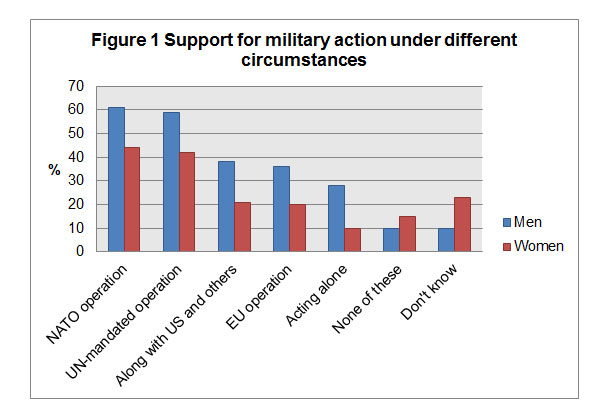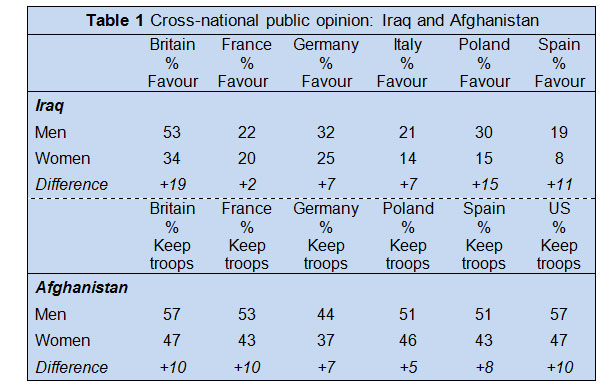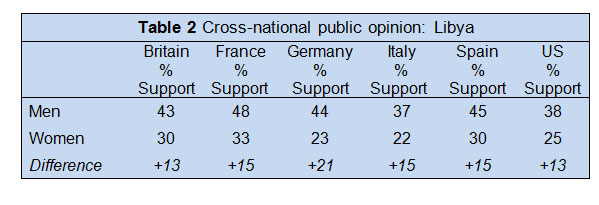In little over two decades, British forces have been involved in operations of varying type and duration, including the Gulf War, Bosnia, Kosovo, Afghanistan, Iraq and, most recently, Libya. Both at the outset and during the course of these military operations, commercial polling companies and academic surveys have endeavoured to record public attitudes towards the conflicts
Public opinion within Britain
Public opinion data are a valuable source for academic research into the groups within the British population who tend to be for or against involvement in specific military conflicts; and indeed for identifying those groups who tend to have ‘hawkish’ or ‘dovish’ stances on foreign affairs more generally. Recent research into the wars in Iraq and Afghanistan showed that approval for the wars divided along sociological and attitudinal lines.[1] For example, men were more likely than women to approve of British involvement in both conflicts. Analysis of public opinion towards military action in Libya in 2011 told a similar story;[2] again, men were more supportive of military action. This ‘gender gap’ in British public opinion is also a longstanding feature of public opinion in the US in this area.[3]
Earlier research into attitudes towards military conflict showed that a ‘gender gap’ was also present in polling data collected in Britain during the early post-WW2 decades. Based upon various polls conducted in the period 1955-66, asking about approval for the potential use of force in different scenarios, there was an average ‘gender gap’ of 8.5% in British public opinion (men: 47.1%; women 38.6%).[4] Recent evidence from a Chatham House –YouGov Survey conducted in 2011 shows that, when asked hypothetically about a series of military intervention scenarios, men were more likely than women to support action being taken in every case (see Figure 1).

Source: The Chatham House-YouGov Survey 2011.
Question: ‘Military action could be undertaken by Britain alone or in coalition with other countries. Under which of the following circumstances do you think it would be acceptable for Britain to take military action? Please tick all that apply or, if you think military action would never be acceptable, choose ‘none of these’.’
The Chatham House-YouGov Survey also explored attitudes towards taking military action against Iran – if necessary – in order to prevent it from having nuclear weapons. Again, men were more likely than women to support such a move (39% compared to 28%). Levels of opposition were near-identical (47% for men and 48% for women); though women were more likely to have no opinion either way (24% responded ‘don’t know’ compared to 15% of men).
Comparing public opinion in Britain with other countries
Britain’s role in recent military conflicts has occurred under the auspices of multi-national efforts, such as the role of NATO in Afghanistan and Libya, or the ‘coalition of the willing’ in Iraq. This generates an interest in comparing public opinion across countries, as well as within countries, particularly in those states contributing to military efforts and also in those countries who may have explicitly opposed taking military action (as Germany, France and many other countries did in the run up to the invasion of Iraq in 2003). From this data, we learn that the ‘gender gap’ in attitudes towards military action is not only a characteristic of public opinion in Britain.
Table 1 compares attitudes towards the wars in Afghanistan and Iraq using data from the Pew Global Attitudes Project, based on cross-national surveys conducted in 2003 (Iraq) and 2010 (Afghanistan). For Iraq, Table 1 shows responses to a question that asked respondents whether they favoured or opposed military action to end Saddam Hussein’s rule in Iraq. The question on Afghanistan asks whether troops should stay until the situation has stabilised, or should be withdrawn as soon as possible. Note than the first question includes respondents from Italy while the second question includes respondents from the US.

Source: Pew Global Attitude Surveys 2003 and 2010.
Note: Excludes ‘don’t know’ responses.
Questions:
2003: ‘Thinking about possible war with Iraq, would you favor or oppose (Survey country) joining the U.S. and other allies in military action in Iraq to end Saddam Hussein’s rule?’ and ‘Thinking about possible war with Iraq, would you favor or oppose the U.S. and other allies taking military action in Iraq to end Saddam Hussein’s rule?’
2010: ‘Do you think the U.S. and NATO should keep military troops in Afghanistan until the situation has stabilized, or do you think the U.S. and NATO should remove their troops as soon as possible?’
While the size of the ‘gender gap’ varies across countries, its direction does not: men are more likely than women to have favoured military action in Iraq and to support troops staying in Afghanistan. The average cross-national ‘gender gap’ is 8% for Afghanistan and 10% for Iraq. Similarly, Table 2 shows attitudes towards military action in Libya by gender for six countries, using polling data collected at the outset of military action. The data tell a similar story to that in Table 1. The magnitude of the ‘gender gap’ in support varies across countries – produced by subtracting women’s level of support from that of men’s – but it is in the same direction in each case: men were more supportive than women, with an average ‘gender gap’ in support of 15%.

Source: Harris / Financial Times March-April 2011
Question: ‘To what extent do you support or oppose the current military intervention in Libya?
Conclusion
There is evidence then to suggest a reasonably consistent ‘gender gap’, over time and across countries. Indeed, recent research noted that ‘it would be rare to find scholarship in which gender differences on the question of using military force are not present’.[5] What accounts for the ‘gender gap’ in attitudes towards war and military intervention? Scholarly research has focused on three particular theoretical explanations: empathy, consensus orientation, and political feminism.[6] Empathy relates to women’s supposed greater compassion for the victims of war, though there is disagreement as to whether this is due to genetic factors, early socialisation experiences or women’s mothering role in society. The consensus orientation is based on psychological differences between women and men, with the former laying greater value on group relationships and the use of cooperation and compromise, rather than aggressive means, to resolve disputes. The political feminism perspective argues that, rather than women per se being opposed to war, feminists (which could include men) tend to be against as military conflicts are usually fought in men’s interests and the costs of war fall heavily on civilian women and children.[7]
Further research is needed, in Britain and elsewhere, into the relevance and explanatory power of these theoretical perspectives in accounting for the ‘gender gap’ in attitudes on military conflict, where states exercise their ‘hard power’. Research could also examine whether there are differences, within countries and cross-nationally, in men’s and women’s attitudes on other issues relating to foreign affairs, including those where countries can exercise their ‘soft power’
—
Ben Clements is Lecturer in the Department of Politics and International Relations, University of Leicester. His research interests include public opinion on the EU and foreign policy issues; voting, elections and political participation in Britain; and the impact of religion on attitudes and political behaviour in Britain. He is currently researching a monograph on the impact of religion on political attitudes and behaviour in Britain (for Palgrave Macmillan).
[1] B, Clements, (2011), ‘Examining public attitudes towards recent foreign policy issues: Britain’s involvement in the Iraq and Afghanistan conflicts’, POLITICS, 32: 63-71.
[2] B. Clements (2012), ‘Public opinion in Britain towards military action in Libya: A micro-level analysis’, forthcoming, POLITICS.
[3] V. Burris (2008), ‘From Vietnam to Iraq: Continuity and Change in Between-Group Differences in Support for Military Action’, Social Problems, 55: 443-479; M. Nincic and D. J. Nincic. 2002. ‘Race, Gender, and War’, Journal of Peace Research, 39: 547-568.
[4] L. C. O. Brandes (1994), Public Opinion, International Security Policy, and Gender. The United States and Great Britain since 1945. Unpublished doctoral dissertation, Department of Political Science, Yale University, p. 107.
[5] R. C. Eichenberg and R. J. Stoll (2011), ‘Gender Differences or Parallel Publics? The Dynamics of Defense Spending Opinion in the United States, 1965-2007’, Journal of Conflict Resolution, 1-18, DOI:10.1177/0022002711420983, p. 5
[6] D. J. Brookes and B. A. Valentino (2011), ‘A war of one’s own: Understanding the gender gap in support for war’, Public Opinion Quarterly, 75(2): 270–286.
[7] Ibid, pp. 271-3.
Further Reading on E-International Relations
- A Global Movement to End Violence against Women in Politics and Public Life
- Islamic State Men and Women Must be Treated the Same
- Opinion – It’s Time to Redefine Gender Mainstreaming
- Gender Troubled? Three Simple Steps to Avoid Silencing Gender in IR
- Gender Representation in IR Journals: Experience from Indonesia
- Opinion – How Polish Women Fight Their Right-Wing Government